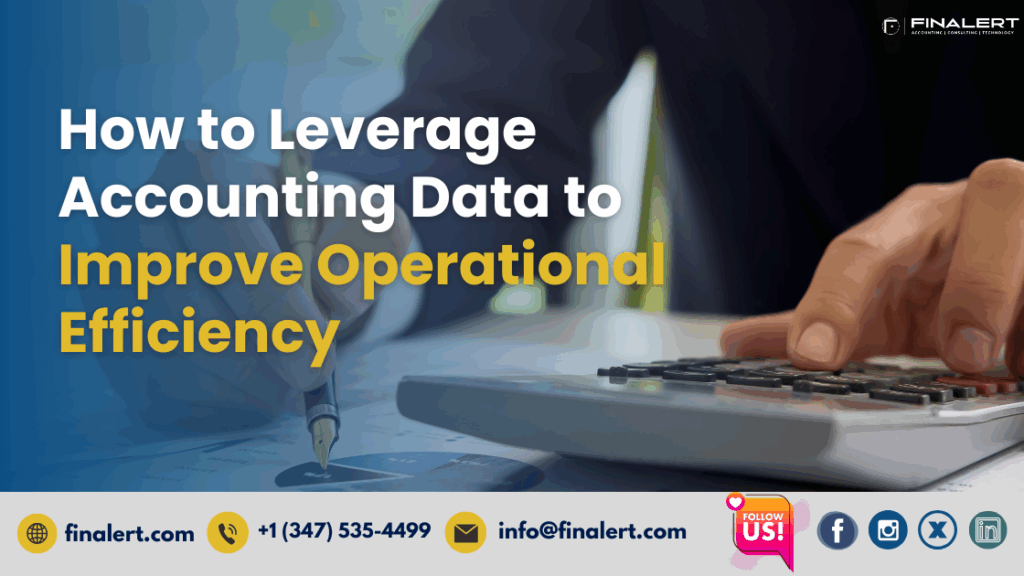
In today’s fast-paced business environment, leveraging data has become paramount to enhancing operational efficiency. Accounting data, often viewed as a set of figures for financial analysis, holds more power than just helping you prepare reports for tax filing or financial statements. With the right approach, it can unlock tremendous opportunities to streamline operations, reduce inefficiencies, and make data-driven decisions that can shape the future of a business.
Finalert, with its expertise in accounting, consulting, and technology services, understands the crucial role accounting data plays in driving business efficiency. This article delves into how businesses can tap into this valuable resource to optimize operational workflows and improve overall productivity.

Understanding how to convert accounting data into meaningful insights is not always straightforward. While the data is inherently useful, there are common challenges that many businesses face when attempting to leverage it effectively.
One of the primary obstacles businesses encounter is the fragmented nature of their accounting systems. With different departments operating on disjointed software solutions, obtaining a comprehensive view of operational efficiency becomes challenging. Without the integration of data from sales, inventory, HR, and accounting systems, it’s impossible to make fully informed decisions that can lead to streamlined processes.
Another challenge arises from the sheer volume of data available. Accounting departments typically generate large quantities of data daily, much of which might seem irrelevant or overwhelming when not sorted and analyzed efficiently. With so much information available, identifying actionable insights becomes a task in itself, with businesses failing to focus on what truly drives operational efficiency.
Although accounting data contains valuable operational insights, many businesses underutilize it due to insufficient or inadequate reporting tools. Without the ability to generate tailored reports or automate data analysis, organizations miss out on opportunities to uncover inefficiencies or areas for improvement. Accounting departments may struggle to offer relevant recommendations or detect issues that could easily be resolved with better reporting mechanisms.
Addressing the challenges mentioned above is achievable by adopting a combination of modern practices, tools, and strategies. By organizing, integrating, and analyzing data strategically, businesses can drastically improve their operational efficiency.

Centralizing data management is one of the most effective ways to enhance accounting operations. By integrating financial and operational data in a single platform, businesses eliminate silos between different departments. Technologies like ERP systems and cloud-based software enable businesses to store accounting, HR, inventory, and sales data in one place, giving managers real-time access to vital business information.
With centralized data, decision-makers can assess every part of the business without the traditional limitations. For instance, Finalert helps businesses select and implement integrated solutions that enable teams to quickly assess key performance indicators and streamline reporting processes across departments.
To reduce the burden of data overload and manual data manipulation, businesses must adopt advanced reporting and analytical tools that can automate key tasks. Leveraging accounting software equipped with automated reporting and predictive analytics capabilities can provide companies with the insights they need to proactively address inefficiencies.
For example, automated financial reports that break down expenditures, revenue sources, and profit margins can highlight operational areas requiring adjustment. Finalert guides clients to utilize cutting-edge tools such as customized dashboards that allow businesses to track operational data and generate tailored reports, ultimately fostering informed decision-making and reducing human error.
Effective use of accounting data can also optimize financial forecasting and budgeting. Tools that analyze past financial data and present forecasts based on trends in revenue, expenditures, and cash flow enable businesses to streamline their resource allocation. These tools also allow decision-makers to spot inefficiencies within operational budgets and reduce costs in areas where financial resources may be under-utilized.
Finalert’s strategic approach to financial modeling equips businesses with precise budgeting tools, transforming raw data into useful insights that help optimize cost allocation, ultimately improving operational productivity.
By utilizing accounting data to analyze real-time operational metrics, businesses gain a clearer picture of their day-to-day efficiency. Data-driven insights from areas such as cash flow, accounts payable/receivable, inventory turnover, and payroll can reveal where bottlenecks are forming in business operations.
Finalert is adept at implementing systems that provide businesses with key performance indicators (KPIs) for real-time analysis, which are critical for maximizing operational efficiency and driving improvements across departments.
As the business world continues to innovate, new trends are emerging in how accounting data is leveraged for operational efficiency. Technologies such as artificial intelligence (AI) and machine learning are poised to revolutionize how businesses make data-driven decisions.

The integration of AI into accounting software allows businesses to make better predictions based on accounting data. For example, machine learning algorithms can forecast future financial trends and automate the generation of performance reports. With AI’s ability to process vast amounts of data at high speeds, businesses can identify potential issues even before they occur, saving both time and money.
Finalert remains at the forefront of technological advancements, advising clients on how best to integrate AI-powered systems for predictive analytics and insights that drive operational efficiency.
Automation is rapidly becoming a game-changer in accounting and operational efficiency. Robotic Process Automation (RPA) can automate repetitive tasks such as data entry, invoicing, and expense management. By automating these processes, businesses can not only speed up operations but also free up human resources to focus on strategic activities.
Finalert supports clients in implementing tailored automation solutions that streamline accounting functions and support operational efficiency, thereby enhancing productivity in the long term.
Adopting best practices and cutting-edge solutions to leverage accounting data yields numerous benefits that positively impact a company’s performance:
Incorporating accounting data into your operational strategy is an incredibly powerful way to achieve efficiency improvements. Whether it’s centralizing data, leveraging advanced reporting tools, or utilizing predictive analytics, the process leads to faster, more informed decisions that reduce costs and enhance business performance.
Finalert offers a range of accounting, consulting, and technology services to help businesses implement these solutions, stay ahead of trends, and achieve sustained growth. If you’re looking for guidance on how to leverage your accounting data to improve operational efficiency, feel free to contact us at (347) 535-4499.
Similar Articles
No results available
Get in touch with Finalert today for tailored business solutions!
No results available
Ready to thrive? Connect with Finalert today and let’s succeed together in the dynamic global market.
© 2025 Finalert. All rights reserved.
Ready to grow with confidence and clarity?
Finalert delivers high-quality accounting, financial advisory, and analytics services tailored to growing businesses providing control, visibility, and decision-ready insight to support sustainable success.
Address
Our Services
Accounting Services
Advisory Services
Industries
Quick Links
© 2026 Finalert® LLC. All Rights Reserved.